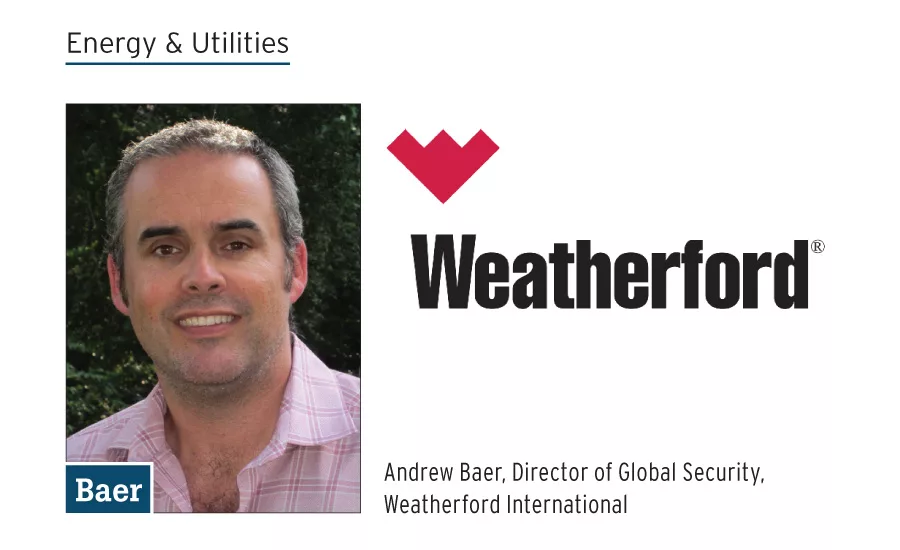Andrew Baer: Embracing Diversity in a Global Environment

With more than 1,000 locations in more than 100 countries throughout the world, Weatherford International is one of the largest multi-national oil field service companies, employing more than 32,000 people. As Director of Global Security, Andrew Baer is responsible for protecting all of Weatherford’s assets. “That would include all their personnel, their property, their information, etc.,” Baer says. “I sort of wear two hats. One is the protection of those assets, and the other is the response to events that impact those assets.”
The best thing about working in the energy and utility sector is the diversity, says Baer. “I get to travel to other countries and see other cultures. From a professional perspective, the learning opportunities are endless because I get to see how we would deal with a situation in a modern, major metropolitan environment, and then how we would deal with that in a remote desert environment where we don’t have the technological solutions that are available to us elsewhere,” he says. “Gaining that insight is a really incredible learning experience. I also get to work with security professionals from all around the world. Everybody brings something different to the challenges that we face.”
One of the obviously unique challenges of being in the oil and gas industry is the intrinsic risk in many of the operation locations, like the Middle East and Africa. “This is where the dual hat role comes about because my job is to protect people, but we will all come together in a crisis management to respond when we have people in trouble,” says Baer. Between the political environments in which oil is extracted, the heavy machinery, the potential weather hazards, and the dangerous materials, “it’s a very complex and risky environment in which to operate on a day by day basis,” Baer says. “The nature of our industry is to go to the places where we can extract oil, and those places are not in the easiest parts of the world to operate.”
As a security leader, Baer primarily focuses on four areas: keeping employees out of harm’s way, always knowing where employees are, responding quickly to a crisis, and corporate and social responsibility programs. “We must understand the context of the environments in which we’re operating,” says Baer. “We need to understand and be aware that in all of these environments we go into, we have an impact on the people. We have to have a really key understanding of what our impact is and make sure it’s positive.”
Baer particularly enjoys working with his peers. “We’re a sector that operates in inherently challenging environments, so it’s really refreshing that across our peer group there is an attitude that we don’t compete in the protection of our people,” he says. “There’s a lot of information sharing, a lot of cross-organization collaboration.” He also feels appreciated by the Weatherford C-suite. “Security is rapidly evolving. I think they probably feel that we are, in a positive way, boundary probing and always looking for a different way to do things.”
Security’s value can be seen in the significant increase in communication between the organization and the security department. “That tells me that all the messaging regarding the security function being key to supporting the entire organization is effective and also that the organization is embracing the company’s decision to have a formalized security program that is available to all of the employees,” says Baer. “We operate successfully in very, very challenging security environments. To me, that’s a measure of the value of our program as well, that we can operate there and we’re able to effectively manage those risks and enable the business to continue there.”
Staying informed about where everyone is and where all the assets are is the most difficult part of Baer’s job. “I think the evolution of some of the security challenges we’re seeing now is continually reminding us that we can be faced with events at a moment’s notice in environments that we’re not necessarily expecting them to occur,” he says. “It’s that shift from the mindset of focusing on the historic high-risk environments to looking globally all the time and putting resilient plans in place for environments we previously might not have given that much attention.”
When he’s not traveling the world, Baer enjoys spending time with his wife and two boys. “I make furniture out of timber, and I enjoy fly fishing,” he says. “I like to try and get away from it all.”
Security Scorecard
Annual Revenue: $9.43 billion
Security Budget: $37 million
Critical Issues
-
Crime
-
Political Instability
-
Security Budgets
Looking for a reprint of this article?
From high-res PDFs to custom plaques, order your copy today!






